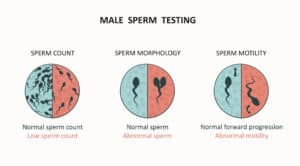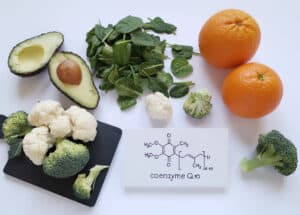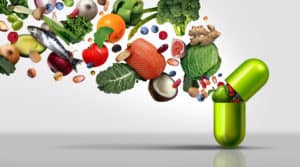Share this post
Simple ways to improve male fertility
If you’re planning to start a family, here’s how to improve your chances of success.
About 2/3 of couples succeed in getting pregnant within six months of starting unprotected sex. However, as many as 1 in 6 couples do not become pregnant within a year.
Although the focus is often on the woman, half of all infertility cases involve the man’s health. Poor sperm quality is often the culprit.
Incredibly, the total number of “little swimmers” (sperm) a man produces has dropped by about half since the 1950s. This means that it can take longer for a couple to become pregnant.
A recent study, for instance, showed 84% of men living in areas with high levels of pollution had damaged sperm. Sperm quality is also reduced by unhealthy diets, obesity, smoking, alcohol, and recreational drugs.
That’s the bad news.
The good news is that improving your diet can improve your sperm health.
For better sperm health, follow a healthy diet
Diets high in processed foods, red meat, saturated fat, and sugar are generally bad for our health. This type of diet is also associated with poor sperm quality (see above image).
By contrast, a healthy diet that includes fish, whole grains, fruits, and vegetables may improve sperm quality and fertility in both men and women.
The Mediterranean diet is one example of a diet that can improve sperm health. A controlled clinical trial showed that men had better sperm quality within four months of switching to a Mediterranean diet.
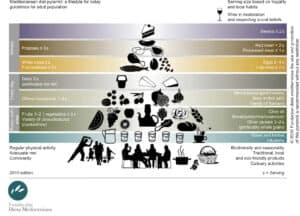
The power of healthy foods lies in the nutrition they provide. Vitamins, minerals, antioxidants, and essential fatty acids are all important for fertility.
Unfortunately, fewer than one in 10 Americans meet the recommendations for fruit and vegetable intake, making poor nutrition common. Supplements can help fill in the gaps.
Male fertility: which supplements make sense?
In addition to a healthy diet, men may benefit from three types of fertility supplements:
- Coenzyme Q10 (CoQ10)
- Omega-3 fatty acids (fish oil)
- Multivitamins/minerals
In a recent clinical study, men with low sperm quality were assigned to a healthy diet and exercise plan. The plan included supplementation with coenzyme Q10 (100 mg/day), omega-3 fatty acids (1 gram/day), and a multivitamin. The men’s sperm quality improved after three months.
Coenzyme Q10, omega-3 fatty acids, and multivitamins may improve sperm health
Coenzyme Q10: Pollution, unhealthy diets, and stress can drain the body’s antioxidant stores and damage sperm. Antioxidant supplements can help correct the imbalance.
CoQ10 is a natural antioxidant found in food. In clinical trials, supplemental CoQ10 (at a dose of 100 to 400 mg/day) significantly improved sperm quality within three to six months.
Omega-3 fatty acids: Omega-3 fatty acids found in fish are essential for health and fertility in men and women. U.S. guidelines state adults should eat two portions of fish each week for good health. Unfortunately, most of us don’t eat enough fish.
Men who took fish oil for three months had 64% greater semen volumes than men who did not. In a study of infertile men, omega-3 supplementation improved semen quality after eight months. Studies suggest adults need 500 to 1,000 mg of omega-3 fatty acids per day.
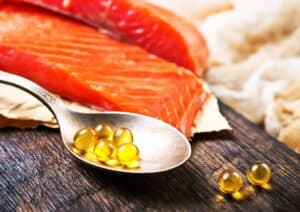
Multivitamins: Modern diets are often low in key vitamins and minerals. Adults who do not take dietary supplements have the greatest risks of a deficiency. Thankfully, multivitamins can help men (and women) meet their needs.
Vitamins C, D, E, folic acid, and zinc are especially important for healthy sperm. In men who were infertile due to unknown causes, a daily multivitamin improved sperm numbers and sperm motility after three months.
Fun fact: Men produce sperm every day, but it takes about three months for each batch of sperm to develop. Developing sperm are sensitive to nutrition throughout this time. This explains why it takes at least three months to “see” an effect of supplementation on sperm quality.
In sum, it’s never too soon to plan for a successful pregnancy. Healthy nutrition can strengthen your sperm and boost your chance of co-creating a healthy baby!
References
The information provided in this article is supported by scientific studies. Here are the citations for those who wish to dig deeper.
Click here to see ReferencesAbbasihormozi SH, et al. Stress hormone and oxidative stress biomarkers link obesity and diabetes with reduced fertility potential. Cell J. 2019 Oct;21(3):307-13.
Afeiche MC, et al. Processed meat intake is unfavorably and fish intake favorably associated with semen quality indicators among men attending a fertility clinic. J Nutr. 2014;144:1091-8.
Agarwal AA, et al. Male Oxidative Stress Infertility (MOSI): proposed terminology and clinical practice guidelines for management of idiopathic male infertility. World J Mens Health. 2019 Sep;37(3):296-312.
Agarwal A, et al. Utility of antioxidants in the treatment of male infertility: clinical guidelines based on a systematic review and analysis of evidence. World J Mens Health. 2021 Apr;39(2):233-90.
Andersson A-M, et al. Adverse trends in male reproductive health: we may have reached a crucial ‘tipping point’. Int J Androl. 2008 Apr;31(2):74-80.
Aitken RJ, et al. Causes and consequences of oxidative stress in spermatozoa. Reprod Fertil Dev. 2016;28(1-2):1-10.
Aitken RJ, Baker MA. The role of genetics and oxidative stress in the etiology of male infertility – a unifying hypothesis? Front Endocrinol (Lausanne). 2020 Sep 30;11:581838.
Aitken RJ. The changing tide of human fertility. Hum Reprod. 2022 Apr 1;37(4):629-38.
Aitken RJ, et al. Male infertility and oxidative stress: a focus on the underlying mechanisms. Antioxidants (Basel). 2022 Feb 2;11(2):306.
Alahmar AT. The impact of two doses of coenzyme Q10 on semen parameters and antioxidant status in men with idiopathic oligoasthenoteratozoospermia. Clin Exp Reprod Med. 2019 Sep;46(3):112-8.
Alahmar AT, et al. Coenzyme Q10, oxidative stress markers, and sperm DNA damage in men with idiopathic oligoasthenoteratospermia. Clin Exp Reprod Med. 2021 Jun;48(2):150-155.
Alahmar AT, Singh R. Comparison of the effects of coenzyme Q10 and Centrum multivitamins on semen parameters, oxidative stress markers, and sperm DNA fragmentation in infertile men with idiopathic oligoasthenospermia. Clin Exp Reprod Med. 2022 Mar;49(1):49-56.
Alahmar AT, Naemi R. Predictors of pregnancy and time to pregnancy in infertile men with idiopathic oligoasthenospermia pre‐and post‐coenzyme Q10 therapy. Andrologia. 2022 Feb 1:e14385.
Aoun A, et al. Can nutrition help in the treatment of infertility? Prev Nutr Food Sci. 2021 Jun 30;26(2):109-20.
Arenas‐Jal M, et al. Coenzyme Q10 supplementation: efficacy, safety, and formulation challenges. Comp Rev Food Sci Food Safety. 2020 Mar;19(2):574-94.
Balercia G, et al. Coenzyme Q10 treatment in infertile men with idiopathic asthenozoospermia: a placebo-controlled, double-blind randomized trial. Fertil Steril. 2009 May;91(5):1785-92.
Berby B, et al. Oxidative stress is associated with telomere interaction impairment and chromatin condensation defects in spermatozoa of infertile males. Antioxidants (Basel). 2021 Apr 12;10(4):593.
Bird JK, et al. Risk of deficiency in multiple concurrent micronutrients in children and adults in the United States. Nutrients. 2017 Jun 24;9(7):655.
Blumberg JB, et al. Contribution of dietary supplements to nutritional adequacy in various adult age groups. Nutrients. 2017 Dec 6;9(12):1325.
Bouayed J, Bohn T. Exogenous antioxidants–double-edged swords in cellular redox state: health beneficial effects at physiologic doses versus deleterious effects at high doses. Oxid Med Cell Longev. Jul-Aug 2010;3(4):228-37.
Bonaccio M, et al. Adherence to a Mediterranean diet is associated with a better health-related quality of life: a possible role of high dietary antioxidant content. BMJ Open. 2013 Aug 1;3(8):e003003.
Buhling K, et al. Influence of oral vitamin and mineral supplementation on male infertility: a meta-analysis and systematic review. Reprod Biomed Online. 2019 Aug;39(2):269-79.
Bungum M, et al. Sperm DNA integrity assessment in prediction of assisted reproduction technology outcome. Hum Reprod. 2007 Jan;22(1):174-9.
Chen H, et al. Does high load of oxidants in human semen contribute to male factor infertility? Antioxid Redox Signal. 2012 Apr 15;16(8):754-9.
Cheng Y, et al. Semen quality and sperm DNA methylation in relation to long-term exposure to air pollution in fertile men: a cross-sectional study. Environ Pollut. 2022 May 1;300:118994.
D’Angelo S, Meccariello R. Microplastics: a threat for male fertility. Int J Environ Res Public Health. 2021 Mar 1;18(5):2392.
d’Argent EM, et al. High-dose supplementation of folic acid in infertile men improves IVF-ICSI Outcomes: a randomized controlled trial (FOLFIV Trial). J Clin Med. 2021 Jan;10(9):1876.
Delbarba A, et al. Positive effect of nutraceuticals on sperm DNA damage in selected infertile patients with idiopathic high sperm DNA fragmentation. Minerva Endocrinol. 2020 Jun;45(2):89-96.
De Leo V, et al. Positive effect of a new combination of antioxidants and natural hormone stimulants for the treatment of oligoasthenoteratozoospermia. J Clin Med. 2022 Apr 2;11(7):1991.
Dutta S, et al. Oxidative stress and sperm function: a systematic review on evaluation and management. Arab J Urol. 2019 Apr 24;17(2):87-97.
Efrat M, et al. Sugar consumption is negatively associated with semen quality. Reprod Sci. 2022 May 23:1-7.
Eskenazi B, et al. Antioxidant intake is associated with semen quality in healthy men. Human Reproduction 2005;20(4):1006‐12.
Esteves SC, et al. Sperm DNA fragmentation testing: summary evidence and clinical practice recommendations. Andrologia. 2021 Mar;53(2):e13874.
Ferramosca A, Zara V. Diet and male fertility: the impact of nutrients and antioxidants on sperm energetic metabolism. Int J Mol Sci. 2022 Feb 25;23(5):2542.
Gaskins AJ, et al. Dietary patterns and semen quality in young men. Hum Reprod. 2012 Oct;27(10):2899-907.
Giahi L, et al. Nutritional modifications in male infertility: a systematic review covering 2 decades. Nutr Rev. 2016;74:118-30.
Horsanali MO, et al. Is serum vitamin D level a risk factor for idiopathic male fertility? J Men’s Health. 2022 Apr 1;18(4):86.
Hosseini B, et al. The effect of omega-3 fatty acids, epa, and/or dha on male infertility: a systematic review and meta-analysis. J Diet Suppl. 2019;16(2):245-56.
Humaidan P, et al. The combined effect of lifestyle intervention and antioxidant therapy on sperm DNA fragmentation and seminal oxidative stress in IVF patients: a pilot study. Int Braz J Urol. Jan-Feb 2022;48(1):131-56.
Jensen TK, et al. Associations of fish oil supplement use with testicular function in young men. JAMA Netw Open. 2020 Jan 3;3(1):e1919462.
Karayiannis D, et al. Association between adherence to the Mediterranean diet and semen quality parameters in male partners of couples attempting fertility. Hum Reprod. 2017 Jan;32(1):215-22.
Ko EY, et al. Male infertility testing: reactive oxygen species and antioxidant capacity. Fertil Steril. 2014 Dec;102(6):1518-27.
Krzastek SC, et al. Impact of environmental toxin exposure on male fertility potential. Transl Androl Urol. 2020 Dec;9(6):2797-813.
Lee-Kwan SH, et al. Disparities in state-specific adult fruit and vegetable consumption – United States, 2015. MMWR Morb Mortal Wkly Rep. 2017 Nov 17;66(45):1241-7.
Lewin A, Lavon H. The effect of coenzyme Q10 on sperm motility and function. Mol Aspects Med. 1997;18 Suppl:S213-9.
Lettieri G, et al. Discovery of the involvement in DNA oxidative damage of human sperm nuclear basic proteins of healthy young men living in polluted areas. Int J Mol Sci. 2020 Jun 12;21(12):4198.
Levine H, et al. Temporal trends in sperm count: a systematic review and meta-regression analysis. Hum Reprod Update. 2017 Nov 1;23(6):646-59.
Littarru GP, Tiano L. Bioenergetic and antioxidant properties of coenzyme Q10: recent developments. Molecular Biotechnology 2007;37(1):31‐7.
Lv MQ, et al. Temporal trends in semen concentration and count among 327 373 Chinese healthy men from 1981 to 2019: a systematic review. Hum Reprod. 2021 Jun 18;36(7):1751-75.
Madej, et al. Influence of fruit and vegetable consumption on antioxidant status and semen quality: a cross-sectional study in adult men.
Maghsoumi-Norouzabad L, et al. Vitamin D3 supplementation effects on spermatogram and oxidative stress biomarkers in asthenozoospermia infertile men: a randomized, triple-blind, placebo-controlled clinical trial. Reprod Sci. 2022 Mar;29(3):823-35.
Mancini A, Balercia G. Coenzyme Q(10) in male infertility: physiopathology and therapy. Biofactors. 2011 Sep-Oct;37(5):374-80.
Mínguez-Alarcón L, et al. Dietary intake of antioxidant nutrients is associated with semen quality in young university students. Hum Reprod. 2012 Sep;27(9):2807-14.
Montano L, et al. Effects of a lifestyle change intervention on semen quality in healthy young men living in highly polluted areas in Italy: the FASt Randomized Controlled Trial. Eur Urol Focus. 2022 Jan;8(1):351-9.
Montano L, et al. Mediterranean diet as a shield against male infertility and cancer risk induced by environmental pollutants: a focus on flavonoids. Int J Mol Sci. 2022 Jan 29;23(3):1568.
Nadjarzadeh A, et al. Effect of coenzyme Q10 supplementation on antioxidant enzymes activity and oxidative stress of seminal plasma: a double-blind randomised clinical trial. Andrologia. 2014 Mar;46(2):177-83.
Nassan FL, et al. Diet and men’s fertility: does diet affect sperm quality? Fertil Steril. 2018 Sep;110(4):570-7.
Nassan FL, et al. Association of dietary patterns with testicular function in young Danish men. JAMA Network Open. 2020 Feb 5;3(2):e1921610.
Pravst I, et al. Coenzyme Q10 contents in foods and fortification strategies. Crit Rev Food Sci Nutr. 2010 Apr;50(4):269-80.
Rahban R, Nef S. Regional difference in semen quality of young men: a review on the implication of environmental and lifestyle factors during fetal life and adulthood. Basic Clin Androl. 2020 Oct 15;30:16.
Reider CA, et al. Inadequacy of immune health nutrients: intakes in US adults, the 2005-2016 NHANES. Nutrients. 2020 Jun 10;12(6):1735.
Safarinejad MR. Efficacy of coenzyme Q10 on semen parameters, sperm function and reproductive hormones in infertile men. J Urol. 2009 Jul;182(1):237-48.
Safarinejad MR. The effect of coenzyme Q₁₀ supplementation on partner pregnancy rate in infertile men with idiopathic oligoasthenoteratozoospermia: an open-label prospective study. Int Urol Nephrol. 2012 Jun;44(3):689-700.
Safarinejad MR. Effect of omega-3 polyunsaturated fatty acid supplementation on semen profile and enzymatic anti-oxidant capacity of seminal plasma in infertile men with idiopathic oligoasthenoteratospermia: a double-blind, placebo-controlled, randomised study. Andrologia. 2011 Feb;43(1):38-47.
Salas-Huetos A, et al. Diet and sperm quality: nutrients, foods and dietary patterns. Reprod Biol. 2019 Sep;19(3):219-24.
Salas-Huetos A, et al. Dietary patterns, foods and nutrients in male fertility parameters and fecundability: a systematic review of observational studies. Hum Reprod Update. 2017 Jul 1;23(4):371-89.
Santi D, et al. Seasonal variation of semen parameters correlates with environmental temperature and air pollution: a big data analysis over 6 years. Environ Pollut. 2018 Apr;235:806-13.
Schmid TE, et al. Micronutrients intake is associated with improved sperm DNA quality in older men. Fertil Steril. 2012 Nov;98(5):1130-7.
Skakkebæk NE, et al. Male reproductive disorders and fertility trends: influences of environment and genetic susceptibility. Physiol Rev. 2016 Jan;96(1):55-97.
Skoracka K, et al. Diet and nutritional factors in male (in)fertility-underestimated factors. J Clin Med. 2020 May 9;9(5):1400.
Smits RM, et al. Antioxidants for male subfertility. Cochrane Database Syst Rev. 2019 Mar 14;3(3):CD007411.
Stanhiser J, et al. Omega-3 fatty acid supplementation and fecundability. Hum Reprod. 2022 May 3;37(5):1037-46.
Politano CA, López-Berroa J. Omega-3 fatty acids and fecundation, pregnancy and breastfeeding. Rev Bras Ginecol Obstet. 2020 Mar;42(3):160-4.
Swan SH, Colino S. Count down: how our modern world is threatening sperm counts, altering male and female reproductive development, and imperiling the future of the human race. Simon and Schuster; 2022 Feb 8.
Taner N, Omurtag GZ. The effects of multivitamin use in pregnancy on mother and fetus health. In: Primary Health Care 2021 Jul 12. IntechOpen.
Tariq H, et al. Estimation of folic acid/micro nutrients levels; does it reflect sperm parameters. Int J Clin Pract. 2021 Mar;75(3):e13790.
Thakur AS, et al. Effect of ubiquinol therapy on sperm parameters and serum testosterone levels in oligoasthenozoospermic infertile men. J Clin Diagn Res. 2015 Sep;9(9):BC01-3.
Torres-Arce E, et al. Dietary antioxidants in the treatment of male infertility: counteracting oxidative stress. Biology (Basel). 2021 Mar 20;10(3):241.
Tremellen K. Oxidative stress and male infertility–a clinical perspective. Hum Reprod Update. May-Jun 2008;14(3):243-58.
Vaamonde D, et al. Coenzyme Q10 in fertility and reproduction. In: López Lluch G, ed. Coenzyme Q in Aging. Cham, Switzerland; Springer; 2020:283-308.
Vickram S, et al. Role of zinc (Zn) in human reproduction: a journey from initial spermatogenesis to childbirth. Int J Mol Sci. 2021 Feb 22;22(4):2188.
Wang L, et al. Effects of PM 2.5 exposure on reproductive system and its mechanisms. Chemosphere. 2021 Feb;264(Pt 1):128436.
Wang W, et al. Studying the mechanism of sperm DNA damage caused by folate deficiency. J Cell Molec Med. 2022 Feb;26(3):776-88.
Wilson RD, et al. Pre-conception folic acid and multivitamin supplementation for the primary and secondary prevention of neural tube defects and other folic acid-sensitive congenital anomalies. J Obstet Gynaecol Can. 2015 Jun;37(6):534-52.
Wu W, et al. Association between ambient particulate matter exposure and semen quality in fertile men. Environ Health. 2022 Jan 16;21(1):16.
Xu H, et al. Environmental pollution, a hidden culprit for health issues. Eco-Environment & Health. 2022 May 10;1(1)31-45.
Yamasaki K, et al. Effects of antioxidant co‐supplementation therapy on spermatogenesis dysfunction in relation to the basal oxidation–reduction potential levels in spermatozoa: a pilot study. Reprod Med Biol. 2022 Jan;21(1):e12450.
Zareba P, et al. Semen quality in relation to antioxidant intake in a healthy male population. Fertil Steril. 2013 Dec;100(6):1572-9.
Zhao Y, et al. Association of exposure to particulate matter air pollution with semen quality among men in China. JAMA Netw Open. 2022 Feb 1;5(2):e2148684.
Zhou X, et al. Effects of vitamin E and vitamin C on male infertility: a meta-analysis. Int Urol Nephrol. 2022 May 23 [online ahead of print].
The information provided is for educational purposes only. Consult your physician or healthcare provider if you have specific questions before instituting any changes in your daily lifestyle including changes in diet, exercise, and supplement use.
Share this post
Marina MacDonald, MS, PhD
Related posts
Tocotrienols for Cardiovascular and Bone Health
Why the lesser-known tocotrienol form of vitamin E may be the one we should be studying Vitamin E has long been heralded for its many health benefits, however, the majority of this research has been focused on the tocopherol forms which are more commonly found in nature. In this interview we chat with Barrie…
Vitamin C – Not Just for Pirates
Ascorbic acid for bones, joints, and connective tissue An all macaroni-and-cheese diet? What could possibly go wrong? When I was in University, two students made a friendly wager to see who could go the longest subsisting on a diet of macaroni-and-cheese. The competition came to a screeching halt when one of the boys (the…
Iodine: Essential for the Mother-To-Be
The physical and cognitive health of the developing infant depends on adequacy of this essential mineral Iodine – you may know it as the topical preparation used before surgery for the purpose of disinfecting, or as just another element learned in chemistry courses of high school or college (which you have long forgotten). However,…
A Deep-Sea Remedy for Stress Relief
The fish extract that combats anxiety “What would I give, if I could live out of these waters?” So begins the lament of the mermaid princess Ariel, who dreams of someday living on land and “strolling along on the – what’s that word again? – street.” Clearly, nobody has told The Little Mermaid protagonist…
Simply Molybdenum
An essential nutrient for detoxification and the brain At least nine trace elements are essential for humans: iron, zinc, copper, manganese, iodine, chromium, selenium, cobalt, and molybdenum.[1] Molybdenum has been studied far less than minerals such as iodine, zinc, or selenium. Nevertheless, our understanding of the importance of molybdenum has grown exponentially in recent…
Shining Light on Seasonal Depression
Natural approaches to overcoming seasonal affective disorder (SAD) As charming as I found the quad of the University in the summer, the winter semesters at my alma mater were brutal. It was cold. It was dark. It was damp. Many of my classmates looked ashen, tired, and miserable. In those dark Canadian winters I…
Categories
- Botanicals (56)
- GI Health (53)
- Healthy Aging (121)
- Immune Support (39)
- In The News (39)
- Kids Health (21)
- Stress and Relaxation (50)
- Uncategorized (1)
- Video (9)
- Vitamins & Minerals (51)


